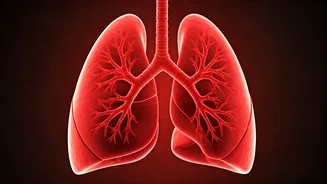Introduction: Lung Health
Maintaining healthy lungs is crucial for overall well-being. The foods we consume play a significant role in lung function. Certain foods can trigger inflammation,
increase mucus production, and exacerbate respiratory problems. By understanding which foods can harm the lungs, individuals can make informed dietary choices to support better breathing and prevent potential complications. This guide provides information to help one make better choices.
Processed Meats: Caution
Processed meats, often packed with nitrates and sulfites, can be harmful to lung health. These additives have been linked to inflammation in the airways, which can worsen conditions like asthma and chronic obstructive pulmonary disease (COPD). The preservatives may also irritate the lungs, making breathing more difficult. Limiting consumption of processed meats, such as bacon, sausage, and deli meats, is a proactive step toward protecting lung health and preventing respiratory issues. These meats are not healthy and should be avoided to the extent possible.
Sugary Drinks: Avoid Them
Excessive sugar intake can contribute to inflammation throughout the body, including the lungs. Sugary drinks, like sodas and sweetened juices, are often high in added sugars, which can worsen respiratory symptoms. High sugar levels may also weaken the immune system, making individuals more susceptible to respiratory infections. Cutting back on sugary drinks and opting for water or unsweetened beverages can help reduce inflammation and support lung health. Making a conscious effort to remove or reduce these drinks is one of the important steps.
Salty Foods: Beware
High sodium intake can cause fluid retention, which may impact lung function by making it more difficult to breathe. The lungs need to be clear to function at their best. Processed foods, fast foods, and snacks are often loaded with sodium. Reducing sodium intake by avoiding salty snacks, canned foods, and fast food can improve lung health and reduce the risk of respiratory problems. Checking labels and choosing fresh, unprocessed foods is also helpful. Pay attention to the labels before buying anything.
Dairy Products: Moderate
For some individuals, dairy products can increase mucus production, which may worsen respiratory symptoms and make breathing more difficult. While dairy is a good source of calcium and other nutrients, the increased mucus can trigger coughs and congestion. People with asthma or allergies may be particularly sensitive to dairy products. It's advisable to moderate dairy consumption and monitor its effects on your respiratory health. Consider alternatives, such as almond or soy milk, if dairy causes issues. Everyone reacts differently.
Fried Foods: Minimize
Fried foods are often high in unhealthy fats, which can contribute to inflammation in the body. This inflammation can affect the lungs and exacerbate respiratory conditions. The high fat content can make breathing more challenging. Limiting the consumption of fried foods, such as French fries and fried chicken, can help reduce inflammation and support better lung health. Opting for healthier cooking methods, like baking or grilling, is a better choice. Make better choices for healthier living.
Refined Grains: Reduce Intake
Refined grains, such as white bread and pasta, have a high glycemic index, which can cause inflammation. Consuming too many refined grains can increase the risk of respiratory problems. These foods often lack the fiber and nutrients found in whole grains, which are essential for overall health. Choosing whole-grain options and limiting refined grains can reduce inflammation and promote healthier lungs. Adding them to one's diet may also help with improving overall health as well.












